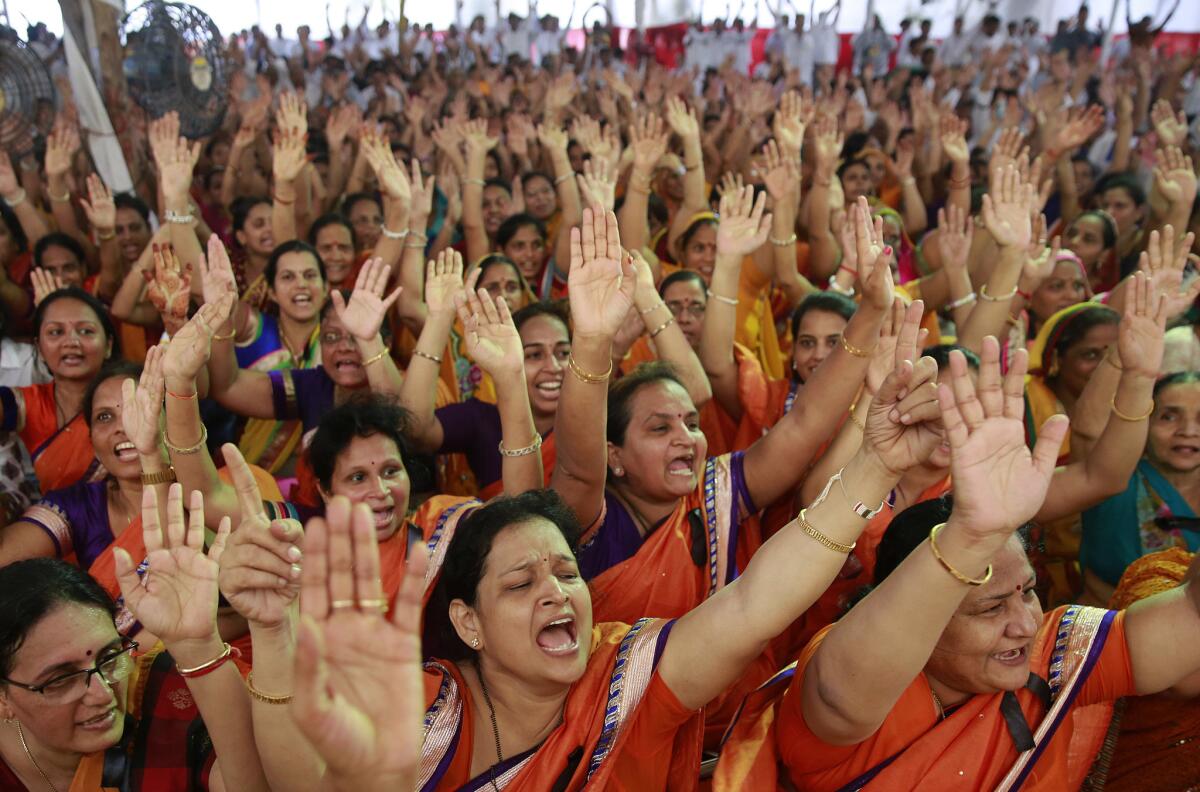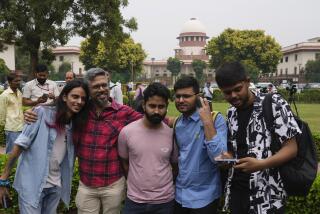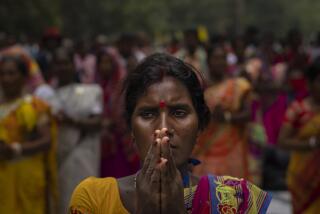India allows Jains to continue fasting until death

Members of the Jain community shout slogans during an Aug. 24 protest in Mumbai, India, demanding the right to fast until death.
- Share via
reporting from Mumbai, India — The Jain religious minority won a significant legal victory Monday when India’s Supreme Court upheld the practice of fasting until death.
The court temporarily shelved a lower-court ruling that outlawed the ritual, which is observed by a few members of the Jain community.
Jain groups had strongly protested the earlier ruling by a court in the northern state of Rajasthan, which said the practice of santhara -- under which Jains renounce food, water and earthly pleasures in order to pave their journey toward the afterlife -- was akin to attempting suicide. Those who engage in the fast are generally elderly.
The Rajasthan court had said santhara was not an “essential” practice and therefore not protected under Indian freedom-of-religion laws. It had also said those assisting in the act could be held criminally liable.
The Supreme Court granted a stay of the judgment as it considers appeals filed by groups who advocate for Jainism, an offshoot of Hinduism. Indian news media reported that the stay could remain in effect for at least four years before the appeals are heard.
Cheering the court action, Praduman Jain, who helped draft an appeal, said India’s constitution “clearly gives us the right to practice our religious beliefs.”
“Jains are a peace-loving community, and it was wrong of the [Rajasthan] High Court to term our age-old tradition illegal,” said Jain, a member of a community group called Akhil Bharat Varshiya Digambar Jain Parishad.
The group’s appeal to the Supreme Court said santhara was not an act to terminate one’s life, but “a conscious process of spiritual purification.” Its proponents have sought to differentiate it from suicide, which they say is often an emotional and impulsive act, while the ritual fast on one’s deathbed is a voluntary, rational act.
Jain said that though there are no age constraints to adopt santhara, it is typically carried out by the elderly and infirm. He estimated that 0.2% of India’s 4.5 million Jains -- who observe an extreme form of nonviolence that eschews even root vegetables because they are deemed to have been alive when harvested -- opt for santhara.
India has sanctioned austere practices by other religious minorities, including a ritual by the Zoroastrian Parsi group in which its corpses are laid out in the sun to be devoured by birds of prey. Some question whether santhara has a place in modern society.
Rashmi Jain, director of the Center for the Study of Social Exclusion and Inclusive Policies at the University of Rajasthan, called santhara “criminal and inhuman” and said it was practiced mainly in families with low levels of education.
“It is a misplaced notion that santhara would lead to salvation,” she said. “Most of the times, the person adopting santhara is on his deathbed. He is beyond the stage where he can plan his death rationally.”
In such cases, she said, families often impose santhara on the dying “to earn some brownie points” with religious authorities.
She accused the Indian government of inconsistency, saying it mandates the force-feeding of political protesters such as Irom Sharmila, an activist who has been on hunger strike for more than a decade, while endorsing religious rituals to appease minorities.
“The Jain community is a powerful community in India,” she said, “and religious power in our country is, unfortunately, too strong.”
Parth M.N. is a special correspondent.
For more news from South Asia, follow @SBengali on Twitter
More to Read
Sign up for Essential California
The most important California stories and recommendations in your inbox every morning.
You may occasionally receive promotional content from the Los Angeles Times.













